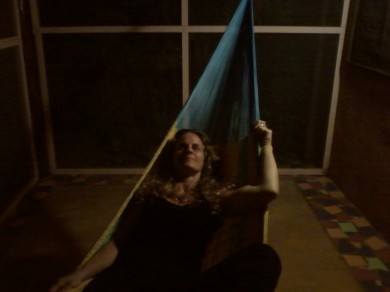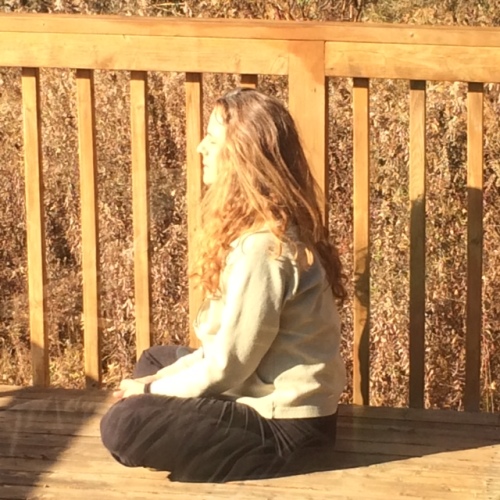Meditating outdoors (when feasible) can bring an effortlessness to the process for some of us. Technique: For 5 to 10 minutes (or more) let your mind focus on the FEELING of the sun on your body, the sounds of nature around you, the fragrances. Feel the air around your skin. Feel the air entering your nostrils and lungs. Let go of effort and feel.
Chances are you will feel more centered and refreshed when you open your eyes. Sometimes answers will come to things you were previously over-thinking.
Posted in Yoga | Tagged meditating outdoors, meditating outside, meditation, short meditation, Yoga | Leave a Comment »

Image of Ganesha in yoga represents the force in the universe that removes obstacles and transforms our ego and pride back into love.
Did your parents teach you about how to be successful in a committed relationship? Did they demonstrate the tools in their own life? You may be one of the lucky ones, but for most of us the answer to these questions is probably a resounding, “no.”
It is my experience that we humans need all the help we can get on our journey into marriage, committed relationships, and deep human connections.
When we allow ourselves to love fully, or fall in love, our hearts are so wide open and vulnerable that if we don’t set our intention to see the “truth” behind our actions we can easily begin to blame our partner for our pain and discomfort.
Our unconscious patterns are sneaky, and before we know it our partner can be a catalyst for us, and trigger our unconscious wounds. Put another way: they help reveal our “shadow” side to us.
My Hakomi therapist friend said to me, “If we didn’t have the wound in the first place, it could not be triggered by our significant others!”
Dr. Robert Augustus Masters says it this way, in his audio program, Knowing Your Shadow.
What I mean by our “shadow” is whatever in us we are disconnected from or out of touch with, whatever we have disowned in ourselves, whatever we have not illuminated or will not illuminate in ourselves, whatever in us we are keeping out of sight.
So our shadow is that zone of us which houses what we have not faced or can’t/ won’t face about ourselves. To the extent that our conditioning (especially that originating in our childhood) is allowed to run us, it is our shadow. Or put another way, to the extent that our conditioning is kept in the dark, it is our shadow.
If we are to truly evolve, we need to know our shadow, and know it very well; if we don’t, our shadow will direct our lives on every level.
In the yoga practices we have many techniques to bring ourselves back to love, to the moment, and to truth by focusing on our bodies and breath as a focal point of meditation.
We also use mantras to focus our minds and set our intentions. A mantra is a sacred utterance, numinous sound, or a syllable, word, phonemes, or group of words believed by some to have psychological and spiritual power. Mantra may or may not be syntactic nor have literal meaning; the spiritual value of mantra comes when it is audible, visible or present in thought.
The Sanskrit word mantra- (m.; also n. mantram) consists of the root man- “to think” (also in manas “mind”) and the suffix -tra, designating tools or instruments, hence a literal translation would be “instrument of thought.”
A simple and powerful mantra to invoke the spirit energy of removing obstacles to love is the Ganesha chant.
“Ganesha” is the Hindu deity in a human form, but with the head of an elephant which represents the power of the Supreme Being that removes obstacles and ensures success in human endeavors. Ganesha is also the destroyer of vanity, selfishness and pride. He is the personification of material universe in all its various magnificent manifestations.
One chant to Ganesha is, “Ganesha Sharanam, Sharanam Ganesha,” which simply means: praises to that force in the universe that can help me remove these obstacles!
I want to BE and experience the love that I am made of, and remember to return to it as much as possible for the rest of my life.
Uh-oh, watch out shadow!
Posted in Yoga | Tagged ganesha, ganesha chant, mantra, mantras, obstacles to love, Relationships, unconscious patterns, yoga of love | Leave a Comment »
Or put in more psychological terms: making the unconscious, conscious.
Or said in more spiritual terms: shining the light on our darkness or shadow side.
So, if we don’t know that we are acting or reacting to circumstances and people in our life out of some unconscious patterning from our past or childhood, how do we then become aware of it?
Here are things that give me a clue that I have gone into an unconscious pattern response:
1. I feel numb and my life energy shuts down
2. My mind seeks to blame when I hurt
3. My partner will tell me or point it out! (not easy, but a quick reminder!)
4. I don’t smile, dance, or listen to music as much
5. My voice sounds irritated
6. I get defensive
7. I get very independent
8. My partner will notice that I am not being my true Self!
What do YOU do when you are hurt or reactive?
Do you see any correlation to what you may have done in response to dysfunctional family patterns?
Bless those that mirror us even though it is so painful!
Posted in Codependency, Codependency and Yoga, Codependent Yogi, communication, intimacy, Letting Go, Opposites, Relationship Triggers, Relationships, relationships with your ex, sharing, Yoga | Tagged Abandonment, awareness, Codependency, Codependent, hitting your wall, intimacy, knowing yourself, Obstacles, relationship triggers, self awareness, shadow | 2 Comments »
Dancing on the edges of my perfect imperfections, with each sweeping step I slough off a little more of the dusty, caked on layers of experience from my past to love and see my partner and my self more clearly.
Love brings up all that is in its way to clear the path back to love.
An intimate relationship with our partner, children, or family members is a perfect place to get a good look at the unconscious soot that has covered our hearts and clouded our thinking.
“Dancing on the edges of my perfect imperfections.” It sounds so poetic, doesn’t it? Yet in those brief, chaotic moments of experiencing my judgements, heart closing down, or projection of my fears on my partner, I am far from feeling elegant or Rumi-like.
Love brings up all that is in its way to clear the path back to love.
Where else could I get such a quick and thorough dose of my own medicine?
Our nervous system is hijacked (fight, flight, freeze) when we’re triggered by something deeply unconscious, or mildly or severely traumatic (I recommend books and videos by Dr. Peter Levine PhD http://www.traumahealing.com/somatic-experiencing/peter-levine.html, trauma recovery through Somatic Experiencing). It is like being pulled out to sea in an undertow. We long for the safety of the shoreline, but there we stay thrashing about for what is usually a little while, but may feel like an eternity.
Self awareness is key to coming back to shore. We can feel and sense into part of our body that feels grounded and peaceful – a technique to stay present to what is real and what is happening to us. Attention to the breath is often a wonderful place to anchor ourselves to the moment, but at these times of heightened reactivity our erratic breath may not be the best anchor.
Conscious relationship IS a daring path to enlightenment for some of us. I think it is a warrior’s path to enlightenment – not for the meek or weak-hearted.
I am grateful for all the master teachers out there that put themselves through hell to share tools for working with ourselves (Robert Augustus Masters http://www.RobertMasters.com, Dr. Peter Levine, Lorin Roche, jsut to name a few.)
I am grateful that in this lifetime, I am naturally committed to taking responsiblity for my reactions through deep reflection, meditation, or consulting with friends or therapists.
I will end with a poem by Lorin Roche (http://www.LorinRoche.com)…
“You don’t have to change yourself.
You don’t have to sit still.
You don’t have to sit cross-legged.
You don’t have to make your mind blank.
You don’t have to calm down.”
Posted in Abandonment, Codependency, Codependency and Yoga, Codependent Yogi, communication, Hitting My Walls, intimacy, longing and love, Relationship Triggers, Relationships, Yoga | Tagged Abandonment, Codependency, Codependent, conscious relationship, hitting your wall, intimacy, relationship triggers, spiritual partnership |
We are such relational and social creatures-wired to connect with each other. W can experience extreme stress when we perceive or feel disconnection from those we love, and in our intimate relationships.
My friend who practices Hakomi Therapy and Somatic Experiencing said to me today, “it is a totally normal response to get triggered when someone withdraws their loving attention.”
Please watch this short video experiment by Dr. Edward Tronick…
http://www.youtube.com/watch?v=apzXGEbZht0
Do you recognize this feeling when your partner pulls away from or appears to withdraw love or attention?
Posted in Yoga |
A friend of mine commented yesterday on a pleasurable pastime of mine – having a glass or two of nice wine at dinner.
She said, “white wine is empty calories. At least red wine has bioflavonoids!” I sat there slightly dumbfounded. I knew, without a doubt, I had never even considered this in my choice to drink wine at all, or when I have had to choose between white wine or red wine.
dumbfounded. I knew, without a doubt, I had never even considered this in my choice to drink wine at all, or when I have had to choose between white wine or red wine.
I don’t think I said anything. I knew at that moment that our perceptions were so totally different, and that any further discussion should be left for another time. The topic could get deep.
So tonight on the way home, after I enjoyed a glass of my favorite Organic (no detectable sulfites) Pacific Redwood Syrah at dinner at Rick’s in Lambertville, NJ, I carefully considered my relationship to wine, and food in general. But before I go into my insights, I’ll just give you some background info about me: I am a Libra sun sign. I love things in moderation. I most often see both sides of an issue. I love balance. I rarely, if ever, overdo anything. I enjoy simple pleasures in moderation. I am daring, yet cautious.
If given the choice between ingesting a periodic glass of wine, which to me is pure pleasure in the form of flavor, or thinking about my caloric intake, I would choose the former (in yoga energetics, pleasure is the “right” of chakra two – location is pelvic region of the body). I do like the light “take the edge off” effect wine has on my brain too.
I realized tonight, that for this friend, not having the wine was just as intensely pleasurable for her because she was doing something she perceived was physically and practically beneficial for her body. Her choice was as natural and obvious to her as my choice was to savor my beloved beverage.
Encountering another person’s reality can at first throw us off and often our minds will judge them. But variety is the spice of life! I love when I can honor people’s preferences and perceptions of life, and at the same time, my own.
My large world view is the spice of my life! I am grateful for my open-minded mind.
As I finish this blog, I raise my glass to my mouth and notice the light reflecting on the bottom of the glass. Ummmm, that was a delicious last sip.
Posted in Yoga | Tagged calories, chakra two, flavor, perception, pleasure, taste, wine, yoga and wine |
Love = YOGA. This intense, loving, new relationship has me waking up with a “Christmas morning” kind of magic I felt as a kid. Fluttery sensations tickle me around my heart area, and the world just seems more friendly. The deep sense of belonging and connection I feel with him spreads out to everything and everyone in my world and beyond. My body feels comforted and cradled like surrendering to the sway of my jungle hammock.
Yet the nudge of fear elbows me unexpectedly from time to time. Those momentary old mind interrogations block the flow of bliss. “Is this for real? How are we doing? Will he pull away? What happens next?” mind asks.
Thankfully, I don’t pay much attention to the content anymore, and I have learned through yoga and meditation practice to let my mind settle down and focus on my body’s sensations. Okay, so let’s feel it Stefani… so there is some edginess of uncertainty (waiting for shoe to drop syndrome)… some restless longing to merge again… some fatigue from the fun-filled nights. Patience. Patience. I accept it. I feel it. I cultivate a feeling of kindness toward myself for plunging into the unknown waters of profound love. I integrate my experience. I move on.
“It’s all good. Te amo,” he thoughtfully texts, and I once again I bathe in the warm relief of our love connection.
“I will love you a minimum of forever, and take responsibility for whatever appears to get in love’s way,” I tell him before I traveled abroad last week. I have never said that to anyone before. I know that I know it is true, and it is scary! I am all in. No turning back now!
My friend Dori reminded me a few weeks ago that finding balance in a relationship is like balancing an egg on a spoon.
And yes, I agree with him. It is all good. The good of growth.

Posted in Yoga | Tagged Codependency, Codependent, Codependent Yogi, dealing with fear in relationship, intimacy, longing, love, love and fear, new relationships, Relationships, restorative yoga, Yoga practice | 1 Comment »
The mind gets a bad rap in some spiritual traditions.
I like my mind most of the time; and there is no need to exterminate it as some practices would have us believe!
Anyway it is a part of us, and a part of this life experience! It can work for us, not against us.
Mind discerns, creates, contemplates and invents good things!
Sometimes it runs a muck, but in a flash it comes back to the present with a little gentleness on our part.
Praises to a healthy mind! And body/mind.
Posted in Beginners Yoga, Beginning to Practice Yoga, Codependent Yogi, Issues in Yoga Practice, Practicing Yoga, Questions about Yoga, Yoga, Yoga Books | Tagged body mind, love your mind, meditation, mind, mind body, Yoga | Leave a Comment »
Reflections of a Codependent Yogi. ~ Stephanie Pappas
Over the years I had heard the term codependent, and thought like most people, that a codependent was basically a needy person. This is not exactly the case, although sometimes neediness is manifested when we get the “codependent crazies.” There is much more to discover about the codependent personality that is enlightening, juicy, and life altering. To really catch ourselves in our patterns, we must become keenly aware of our own subtle internal thought processes and feelings when relating to ourselves and others. This is the yoga of self-awareness. We use everything in life as material to wake ourselves up.
Understanding patterns of codependency gives us a framework for intra and inter personal dynamics that maybe we didn’t learn about in a yoga class or training. Understanding our patterns in yet another way, allows for growth and change.
As yogis and yoginis, isn’t awareness of self and other what we aim for in our practices?
Codependents have been known to give too much, too quickly. And as yoga teachers we are giving all the time. By discovering my own codependent patterns over the last 6 years, and by observing thousands of yoga teachers and students, I notice that most women and most yoga teachers have the tendency toward codependent thought and behavior patterns.
What is Codependency?
There are many books and web sites that discuss the traits and habits of a codependent type personality. I am not going to reinvent the wheel here, but I will give a general list of traits. I suggest that you to read some books by Melodie Beattie. The book, “The Seven Jewels of Codependency” by Robert F. Willard and Michael Gibertini, is a great tool for reframing our behaviors in a more positive light.
Codependent, or codependency, is a psychological term denoting a set of recurring thought and behavior patterns exhibited by an individual. These tendencies are said to have originated from experiences in a dysfunctional family system where one or more members had a mental illness, exhibited compulsive behaviors, or abused substances such as drugs or alcohol. These family members may have consciously or unconsciously inflicted physical, emotional, or mental abuse.
Typical patterns of codependency include: over-giving, low or exaggerated self-esteem, challenges maintaining intimate relationships, difficulty in properly caring for one’s own needs, difficulty setting physical or emotional boundaries, excessive care-giving, external focus on approval and self-worth, people pleasing, attempting to exert control over the thoughts, feelings, or actions of others, hyper-vigilance, excessive worry how others may respond to one’s feelings, undue fear of being hurt and/or rejected by others, and perfectionism.
Now I am going to tell you about some of our good qualities. And we get even better once we become aware.
We have a natural intuition that keeps us safe from danger because we can sense when situations are getting weird and vibes are getting sticky. We are fairly psychic and empathic. We are good people. We are devoted friends and are ready to lend a hand or ear when someone needs us. We sincerely care about people, animals, and the environment. We give nice gifts and remember birthdays. We listen well (when we are not obsessing about others, or “spewing our stories”). We have great parties, we’re great hosts, and we draw people together.
We are honest. We make fantastic employees because we work extra hours, do more than is expected of us, and are great team players. As partners, we are very attentive and give lots of compliments. We usually find ourselves in the healing or helping professions, and we actually do help a lot of people.
Codependents have been known to give too much, too quickly. And as yoga teachers we give so much of ourselves, which is a good thing! WE JUST TEND TO OVERDO IT! From my own experience and from watching other codependents in action, I must agree. We are loving people. This is good. We forget to listen to our intuition and body signals.
Sometimes the window of our heart is wide open, and the breeze is flowing in. Sometimes the window is closed shut, and it feels hot and stifling. Sometimes you leap out the window, and sometimes you feel stuck inside the house. I invite you…
1. To notice when you open up to people in a way that feels healthy to you.
2. To notice when you open up in a way that feels unsafe to you.
3. To notice when you close off to people in a way that feels like “healthy protection” to you.
4. To notice when you close off in a way that feels like “shutting down” to you.
When you recall times when your heart was open, and times when it shut down, I urge you to leave out the mental judgment about these memories as being either right or wrong.
Examining your own patterns with others and life situations provides you with juicy information to use in your self-discovery process.
Give yourself permission to choose how much you give, when you give, and to whom. Sometimes we need to speak our truth more. Sometimes we need to censor ourselves.
The Sponge Club: An Example of the Codependent Crazies in Action
My codependent yogis and friends and I belong to a club. I invented it, and I call it, “The Sponge Club.” We have a blog, a mascot, and a secret handshake.
We have many things in common. And we love to talk about these things that we have in common! We notice that we think differently from others and each other in distinct and sometimes peculiar ways. So, let me tell you about how I perceive us when we are in the grips of codependency conduct. Please remember as I stated earlier in this article that we have many outstanding qualities, too.
First of all, we notice that we are sensitive to criticism and people’s “energy.” If we can take something personally, we will. We crave acknowledgment and praise from our families and strangers as well. If we don’t get it the way we want it, we can get angry, depressed, and start to turn that anger against ourselves. We even speak harshly about those who won’t give us the strokes we want. At times there is suffering, angst and pain in our faces and words.
The world seems to stick to us like flies to glue paper. We can just be taking a simple stroll down the street, or in our cars, and if we are in one of our codependent moods, suddenly we may feel rejected because cashier so-n-so wasn’t nice to us, or Mr. Toll taker gave us a dirty look. We return home with longer faces than we had when we started out on our walk because now we start the internal mental attack. We begin thinking about what it is about us that turn people off, or what we could have done to receive such reactions. Sometimes we feel like we don’t belong anywhere in this world, and everyone is rejecting us. We think that maybe if we were prettier, friendlier, or happier people would treat us better. In some cases, that may actually be true, because we are walking around wearing our dark energy with a funky face. We haven’t learned the delicate skill of separating our self from others. We didn’t have good role models.
Everything feels like our fault! Our boundaries are weak and thin. When we stick up for ourselves we may feel even worse. We absorb problems that aren’t ours to begin with. We want to understand life so badly so that we can help others, but the truth is we have no idea what trouble we are in and how to help ourselves.
We can drown in our own self-pity and tell our stories to others to ease some tension, but the next time we go for a walk, we feel rejected again. The patterns keep repeating themselves, until, of course, we become aware of them.
Okay, maybe I am exaggerating a bit. Does any of this sound familiar to you? If so, you may be a member of the sponge club, and not even know it yet. Yes, I agree that after reading these first paragraphs there may not seem to be many benefits to belonging to the sponge club, but becoming aware is the first step to change of any kind.
Stephanie Pappas, E.R.Y.T. 500, has been practicing and teaching yoga and meditation since 1992. She has been training yoga teachers since 1999 through her Devalila Yoga Teacher Training program. Her book for yoga teachers, Yoga Posture Adjustments and Assisting, published in 2006 was just released in Spanish. Her newest book, Yoga at Your Wall, published in 2009, is for all levels of practitioners. All of her books are available onamazon.com. She is currently working on her latest book project, Reflections of a Codependent Yogi. Visit her blog here.
Posted in Codependency, Codependency and Yoga, Codependent Yogi, communication, over care-taking, Relationships, Yoga | Tagged Codependency, codependency and yoga, Codependent, Codependent Yogi, relationship crazies | 1 Comment »
Is it possible to get a “contact high” from a documentary? Do you remember that term? If you do, then you probably know what I am talking about. I think I got one this week, and
I was reminded, or should I say transported, back to my past experiences with these so-called “spirit’ molecules.
The documentary DMT: THE SPIRIT MOLECULE documentary http://thespiritmolecule.com/ weaves an account of Dr. Rick Strassman’s groundbreaking DMT research through a multifaceted approach to this intriguing hallucinogen found in the human brain and hundreds of plants, including the sacred Amazonian brew, ayahuasca. N-dimethyltryptamine, or DMT, is an extremely short-acting and powerful psychedelic.
Utilizing interviews with a variety of experts to explain their thoughts and experiences with DMT, and ayahuasca, within their respective fields, and discussions with Strassman’s research volunteers, brings to life the awesome effects of this compound, and introduces us to far-reaching theories about its role in human consciousness.
The film transported me back to my few, but profoundly spiritual experiences, in the 1980’s with the compounds used in LSD and Ecstasy. During one long-lasting and strong trip I recall thinking, “ah-ha, so THIS is what the yogis were experiencing and trying to convey to us!”
I remembered some of my deeper experiences during long periods of practice in yoga, meditation, and observing silence.
Reality altering experiences also happened when I was in grammar school and in my teens, during sustained periods of high fever as well. I often had acute strep infections when growing up in the suburb Kendall Park, NJ.
Somehow all these experiences tie themselves together by a fact: they elicited chemical changes within my brain. I can’t explain why, but this documentary did a great job graphically illustrating and articulating the reasons for my chemical induced mystical experiences from a scientific view-point. It made more sense to me.
We naturally have these compounds occurring in our brains. The compounds are made by plants too.
Sometimes through long periods of intense focus, or sudden happenings of grace, or during illness, or with the help of chemicals, we go beyond our puny identities, and expand into the oneness and unity of all things. Yoga =Unity, but it is not a concept when you EXPERIENCE the unity. It becomes a concept when we go back and attempt to intellectually explain the experience to others.
Words can only POINT to the experience. Now, it even feels futile to write this blog at all.
Those of you who know, know, and there is no need to write anything else. Ommmmmmmm…
Posted in DMT, LSD experiences, mystical experiences, Yoga | Tagged DMT, LSD experiences, mystical experiences, unity, Yoga | Leave a Comment »





